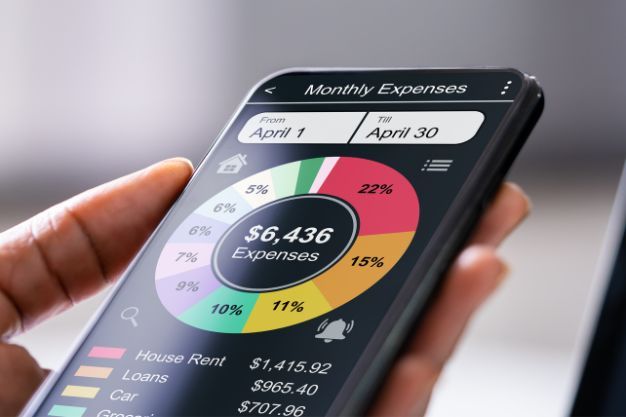

In today’s digital age, managing personal finances has become easier than ever with the help of innovative apps. Let’s explore this topic in more detail with Monkey Mart below. As we look ahead to 2025, a new generation of personal finance apps is emerging, promising to revolutionize the way we save, budget, and invest our money. These cutting-edge tools are designed to help users make smarter financial decisions and achieve their financial goals more efficiently.
Personal finance apps have come a long way since their inception. What started as simple budgeting tools have now evolved into comprehensive financial management platforms. In 2025, we can expect to see apps that not only track expenses and income but also provide personalized financial advice, investment opportunities, and even AI-powered financial forecasting. These apps are becoming increasingly sophisticated, leveraging machine learning algorithms and big data to offer tailored solutions for individual users.
One of the most significant advancements in personal finance apps is their ability to integrate with various financial institutions and services. This integration allows users to have a holistic view of their financial situation, including bank accounts, credit cards, investments, and loans, all in one place. Moreover, these apps are now capable of analyzing spending patterns, identifying areas for potential savings, and suggesting ways to optimize financial decisions.
Read more: Beyond Budgeting: Innovative Strategies for Modern Personal Finance Success
1. FinanceAI Pro: This app stands out for its advanced artificial intelligence capabilities. FinanceAI Pro uses machine learning to analyze your financial behavior and provide personalized recommendations for budgeting, saving, and investing. It can predict future expenses based on your spending history and suggest proactive measures to avoid financial pitfalls.
2. CryptoSave: As cryptocurrencies become more mainstream, CryptoSave offers a unique solution for those looking to incorporate digital assets into their financial planning. This app allows users to track their cryptocurrency investments alongside traditional assets, providing a comprehensive view of their financial portfolio.
3. EconoMind: Focusing on the psychological aspects of personal finance, EconoMind helps users develop better financial habits. It uses cognitive behavioral therapy techniques to address emotional spending and provides tools to build a healthier relationship with money.
4. RetireSmart: Designed for those planning for retirement, RetireSmart offers advanced retirement calculators and scenarios. It takes into account factors like inflation, market volatility, and changing life circumstances to help users create and adjust their retirement strategies.
5. DebtDestroyer: This app specializes in debt management and repayment strategies. DebtDestroyer creates personalized debt repayment plans, negotiates with creditors on behalf of users, and provides tools to visualize progress towards becoming debt-free.
6. InvestMentor: For those interested in learning about investing, InvestMentor offers an educational platform combined with practical investment tools. It provides simulated trading environments, real-time market analysis, and personalized investment recommendations based on user goals and risk tolerance.
7. BudgetBrain: This app takes budgeting to the next level with its neural network-powered expense categorization and predictive budgeting features. BudgetBrain learns from your spending patterns to create dynamic budgets that adjust in real-time based on your financial behavior.
8. TaxSavvy: Simplifying the complex world of taxes, TaxSavvy helps users optimize their tax strategies throughout the year. It provides real-time tax liability estimates, suggests tax-saving opportunities, and even assists in preparing tax returns.
9. InsureWise: This app focuses on helping users manage and optimize their insurance coverage. InsureWise analyzes your current insurance policies, identifies gaps in coverage, and suggests cost-effective insurance solutions tailored to your specific needs.
10. FamilyFinance: Designed for households, FamilyFinance allows multiple family members to collaborate on financial goals. It includes features for teaching children about money management, tracking shared expenses, and planning for major family financial milestones.
When choosing a personal finance app in 2025, there are several key features to consider:
Security and Privacy: With the increasing amount of sensitive financial data being handled by these apps, robust security measures are paramount. Look for apps that use end-to-end encryption, multi-factor authentication, and have a strong track record in data protection.
Integration Capabilities: The ability to seamlessly connect with various financial institutions and services is crucial. Apps that can aggregate data from multiple sources provide a more comprehensive view of your financial situation.
Customization and Personalization: Each individual’s financial situation is unique. Apps that offer customizable features and personalized advice based on your specific financial goals and circumstances are more likely to be effective.
Artificial Intelligence and Machine Learning: Advanced AI capabilities can provide more accurate financial forecasts, personalized recommendations, and insights into spending patterns.
Educational Resources: Apps that offer financial education tools, such as articles, videos, and interactive tutorials, can help users improve their financial literacy and make better decisions.
Goal Setting and Tracking: Features that allow users to set financial goals and track progress towards them can be highly motivating and helpful in achieving long-term financial objectives.
Real-time Alerts and Notifications: Timely alerts about unusual spending, upcoming bills, or investment opportunities can help users stay on top of their finances and avoid potential issues.
Read more: Beyond Budgeting: Innovative Strategies for Modern Personal Finance Success
The rise of sophisticated personal finance apps has had a significant impact on individual financial wellness. These tools have made it easier for people to take control of their finances, leading to several positive outcomes:
Increased Financial Awareness: By providing real-time insights into spending habits and financial health, these apps have helped users become more aware of their financial situations. This increased awareness often leads to more thoughtful financial decision-making.
Improved Budgeting and Saving: With features that automatically categorize expenses and suggest savings opportunities, users find it easier to stick to budgets and increase their savings rates. Many apps gamify the saving process, making it more engaging and rewarding.
Better Debt Management: Apps that focus on debt repayment strategies have helped many users tackle their debts more effectively. By providing clear repayment plans and progress tracking, these tools make the process of becoming debt-free more achievable.
Enhanced Investment Knowledge and Opportunities: Investment-focused apps have democratized access to financial markets and investment education. Users can now learn about different investment strategies, access diverse investment options, and make informed decisions about growing their wealth.
Improved Financial Planning: Long-term financial planning, especially for major life events and retirement, has become more accessible. Apps that offer retirement calculators and scenario planning tools help users visualize their financial future and make necessary adjustments.
Reduced Financial Stress: By providing a clear picture of one’s financial situation and offering tools to improve it, these apps can significantly reduce financial stress. The ability to easily track progress towards financial goals can be both reassuring and motivating.
Read more: Top Financial Mistakes to Avoid in Your 20s and 30s
While personal finance apps offer numerous benefits, there are also challenges and considerations to keep in mind:
Data Security: As these apps handle sensitive financial information, ensuring the security of this data is crucial. Users should be cautious about which apps they trust with their financial data and should always use strong, unique passwords and enable additional security features when available.
Privacy Concerns: Some users may be uncomfortable with the amount of personal financial data these apps collect and analyze. It’s important to carefully review the privacy policies of any finance app you consider using.
Over-reliance on Technology: While these apps can be powerful tools, it’s important not to become overly reliant on them. Users should still develop a fundamental understanding of personal finance principles and be able to make informed decisions independently.
Accuracy of AI Predictions: While AI-powered predictions and recommendations can be helpful, they are not infallible. Users should approach these predictions with a critical eye and consider them as one of many factors in their financial decision-making process.
Keeping Up with Regulatory Changes: As financial regulations evolve, personal finance apps need to stay compliant. Users should ensure that the apps they use are up-to-date with current financial regulations and best practices.